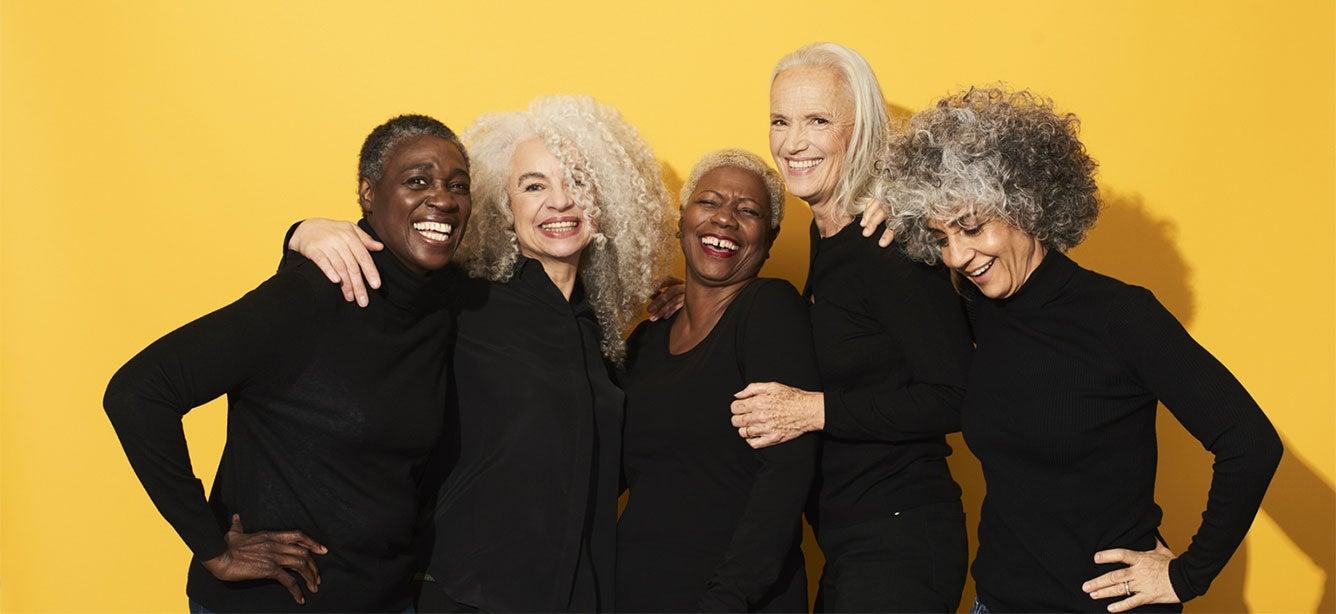
Related Topics
Cholesterol. Sciatica. Cavities, arthritis, and high blood pressure. Most of us don’t hesitate to talk about our physical health and commiserate over aches and pains. However, our sexual and reproductive health is a different story altogether.
“It’s so interesting, because one thing most people over 50 agree on is the lifetime need for intimacy and fun in the bedroom,” observed Kathleen Cameron, former Senior Director at NCOA’s Center for Healthy Aging. “But we clearly don’t want to talk about it—especially when things may not be going well.”
It’s true. Most people (76%) who responded to the University of Michigan’s National Poll on Healthy Aging agreed that sex is a vital part of a romantic relationship at any age. Yet only 17% of them had brought up the subject of sexual health with their healthcare providers in the past two years.
Why are we "seniors" so tight-lipped about sex after 50?
One of the biggest reasons, Cameron explained, is that sexual health tends to be taboo for many people. Not only that, the very idea of it can make us anxious.
“Unfortunately, the more we avoid discussing a topic like sex, the more we contribute to misconceptions and stereotypes,” Cameron said. “It can also be harmful to our health.”
For example, some medical conditions may show up first as sexual dysfunction. Being embarrassed to discuss it, though, may mean that your doctor misses a serious underlying cause. And when you avoid communicating openly with your partner about sex, you both end up at risk for sexually transmitted diseases (STDs) like genital herpes, hepatitis B, syphilis, and gonorrhea.
Enjoying fulfilling intimate relationships after 50 means bringing the topic of sexual health out of the darkness and into the light. So let’s get this conversation started!
First: What is sexual health?
According to the American Sexual Health Association (ASHA), sexual health is "the ability to embrace and enjoy our sexuality throughout our lives."1 Among other things, this means that we can:
- Enjoy sexual pleasure and satisfaction
- Access sexual health education and resources
- Talk freely about sexual health with our partner and others
When one or more of these options or opportunities suffers, so, too, does our overall well-being: as individuals and as a society
Why is sexual health important after 50?
At what age does a man slow down sexually? At what age does a woman stop being sexually active?
These are common questions,” Cameron said. “What’s important to know is that there’s no specific age when sexuality ‘stops’.” After all, she pointed out, we humans are sexual beings by nature—and we don't suddenly lose all interest in sex as soon as—or because—we turn 50.
In fact, sexual health is critically important as we age. First, it allows us to create and maintain emotional intimacy and a sense of closeness with our partner. And research shows that sex also helps to reduce stress by releasing a hormone that makes us feel more relaxed.
Being sexually healthy also supports our overall health. For example, regular sex can reduce the risk for high cholesterol and can even lower blood pressure. The reverse is true as well: good physical health has a positive effect on sexual health. Exercising regularly can help improve stamina in and out of the bedroom. It also improves blood flow to sexual organs, which helps us feel aroused and to experience orgasm.
Our bodies may change as we get older—but that doesn’t have to stand in the way of a healthy sex life.
What sexual changes do men and women go through after 50?
Age-related changes can directly impact on our sexual health and wellness. For instance:
- Women experience significant changes before, during, and after menopause. While every woman is different, these changes may include lowered libido, weight gain, hot flashes, hair loss, and lower mood. In addition, the vagina can change shape and lose its natural lubrication, making sex uncomfortable and less enjoyable.
- In men, erectile dysfunction (ED) is common. Achieving an erection may take longer and not be as potent. Prostate changes can occur, too. If you're diagnosed with prostate cancer, the associated treatment can have substantial side effects related to sexual health. Like women, men may also experience a decline in their sexual drive.
Beyond the natural changes of aging, a number of lifestyle factors and medical conditions can affect our sexual health, too. These include alcohol use, smoking, heart disease, depression, diabetes, and incontinence. Some medications can also wreak havoc with sexual pleasure and performance. For example, statins (for high cholesterol) can interfere with the production of sex hormones like estrogen and testosterone. And certain blood pressure medications, like beta-blockers, can hinder arousal by causing feelings of depression.
How do I maintain sexual health after 50?
There are a number of practical strategies, Cameron advised. These include:
1. Talking to your doctor. Keep in mind that sexual health is just as important as other aspects of your health. If you’ve never broached the subject with your health care provider before, now is the time to start. Whether you're experiencing low libido, ED, or vaginal discomfort, you're not alone. There are likely medications and treatments your doctor can suggest that will help remedy your symptoms.
If your provider doesn't bring up the topic of sexual health at your next check-up, don't be afraid to raise it yourself. "It's important to advocate for yourself in order to get the care and guidance you need," Cameron said. "Start by asking some straightforward questions and build from there."
Some examples of sexual health questions you can ask to your doctor:
- Can we incorporate sexual health into my annual checkups?
- Sex is painful/difficult/impossible for me due to _____. What options do I have to address this problem?
- What are the potential sexual side effects of the medications I'm taking?
- Should I get tested for STDs—and what questions should I ask my partner?
2. Talking with your partner. Discussing sex with your partner may feel uncomfortable at first, but with practice, you’ll feel more at ease. Good communication is essential to a healthy relationship as well as an active, mutually satisfying sex life. Honest discussions can also help protect you both from the health implications of STDs.
Be open about what you expect from an intimate relationship—your likes and dislikes—and encourage your partner to do the same. If libido is a problem, consider issues in the relationship that may be inhibiting your desire for one another. A licensed therapist can help you explore and break through these relationship roadblocks.
3. Living healthy. Generally speaking, what benefits your overall health will also benefit your sex life. That’s why living a healthy life style is a big part of maintaining good sexual health. In addition to seeing your doctor regularly for preventive care, and taking your medications as prescribed, you can support your physical, mental, and sexual health by:
- Making smart food choices
- Exercising regularly
- Avoiding alcohol in excess
- Avoiding or eliminating tobacco use
- Maintaining a healthy weight
- Practicing stress-reduction activities (e.g. yoga or meditation)
Want to know more? Get additional insights on optimizing your health and wellness as you age, from exercise tips to diet and nutrition guidance.
Source
1. National Council on Aging, Aging Mastery Program (AMP), Sexual Health: An Overview.



